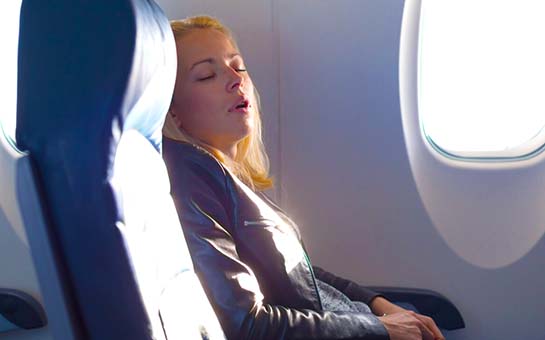If you’ve ever flown a long distance internationally from west-to-east or east-to-west, you’re probably more than a little familiar with the debilitating effects of jet lag. When the time zone of your destination is eight or 12 hours ahead of or behind the time zone you took off from, it can have a major impact on your body. International air travel has made it possible to shrink distances that would have once taken months to traverse into less than a day, and our internal clocks simply aren’t equipped to deal with it.
When the middle of the day feels like midnight, or you’re up all night because 3:00am feels like 1:00pm, it can have a big impact on your trip. You can miss out on large portions of your vacation by sleeping the day away in your hotel bed. You can also be at increased risk of injury or even illness due to sleep deprivation.
Luckily, you can help minimize the effects of jet lag during your next vacation by following these time-tested tips:
1. Adjust Your Sleep Schedule Ahead of Time
If you know you’re going to have to deal with a big time-shift on your next trip, one of the best methods to combat jet lag is by changing your bedtime slowly for a few weeks leading up to your departure.
For instance, let’s say you’re traveling to New York from Mumbai. The time in New York City is 10 hours and 30 minutes behind that of Mumbai. So, start shifting your sleep hours a bit more each day towards New York time for a few weeks before departure. This way, you’ll be closer to the sleep schedule of your destination when you get there.
If you’re going to be arriving in New York during the daytime, try to get up as late as possible on the day of your flight, and take frequent naps and sleep as much as possible during the flight, so you will arrive well-rested when you emerge into the New York sunshine.
On the contrary, if your flight is scheduled to arrive at say, 10:00pm local time, do the exact opposite. Stay awake as much as possible during the flight by reading a book or watching movies. You actually want to be mildly sleep-deprived when you arrive. This way, you’ll be ready to head to the hotel and go to bed as soon as your flight lands in the USA.
2. Up Your Physical Fitness
It’s a proven fact that those who are physically fit suffer less from jet lag. Their bodies are better equipped to cope with the physical and mental stress of long-distance travel, and are thus less affected by changes to their sleep schedule.
Therefore, it’s an excellent idea to speak to your doctor and start an exercise plan as far in advance of your trip as possible. As a bonus, arriving at your destination more physically fit will allow you to enjoy your vacation more, as you’ll be stronger and have more energy.
3. Cut Back on Caffeine and Alcohol
This goes for both leading up to your trip, and during the flight. Caffeine such as in coffee and tea is a stimulant that helps your body stay awake when you’re fatigued or groggy. Alcohol is a depressant that can make you feel sleepier than you actually are. In either case, relying too much on chemicals to alter your sleep patterns can actually make jet lag worse.
While it is true that caffeine can help you stay awake, it certainly won’t make you feel well-rested and refreshed. And while a couple of alcoholic drinks might help you doze off on your flight, numerous studies have shown that it results in less restorative sleep than when your fall asleep naturally.
So, while there’s nothing wrong with a cup of coffee in the morning or a nightcap before bed, try to limit your intake and let your body adjust its clock naturally.
4. Regulate Light Exposure
UV light, such as sunlight, or the light produced by our cellphones and computers, has a big influence on our sleep patterns. Due to our circadian rhythm, our body naturally wants to be asleep when it’s dark, and awake when it’s light. This is easy enough when you’re at home on your normal schedule, but it can be more difficult when you travel internationally.
When it’s time for you to sleep on your flight in order to adjust to your destination’s time zone, it may be the middle of the day. So, to trick your body into believing that it’s darker than it actually is, put on a pair of UV-blocking sunglasses, and make sure you pull the shade on the plane’s window if you can. Also, limit your screen time when it’s time to sleep. Your phone or laptop emits UV light that can make it harder to relax, so put it away.
5. Buy Insurance
Although the preceding steps can help limit the impact of jet lag on your body, it’s impossible to eliminate it entirely. And when you’re feeling fatigued, you can put yourself at greater risk of injury, or even illness.
If you’re an American resident and you’re traveling internationally or domestically for 30 days or less, you may want to consider travel insurance, also known as trip cancellation insurance. A travel insurance plan can help you get reimbursed for your prepaid, nonrefundable trip costs if you have to cancel your trip for a covered reason, plus many other benefits, including emergency medical coverage.
